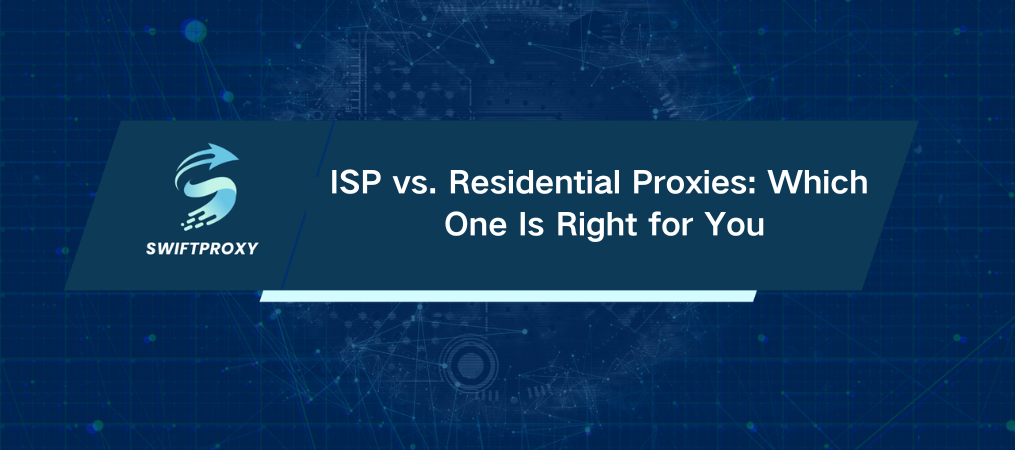ISP vs. Residential Proxies: Which One Is Right for You

In today's digital landscape, choosing the right proxy is crucial. ISP and residential proxies are two heavyweights in the proxy game, and each has its advantages. Understanding the key differences between them will help you make the right decision based on your specific needs. Let's explore what sets them apart.
Understanding ISP Proxies
ISP proxies are a hybrid of data center and residential proxies. Here's the kicker: they combine the speed and stability of data centers with the residential-like appearance of an IP address from a real Internet Service Provider (ISP). The result? They're faster and more reliable than traditional residential proxies, while also less likely to get flagged by websites.
ISP proxies are like renting a high-speed car from a data center and driving it under a residential license plate. They offer fast, efficient performance without raising alarms, unless there's suspicious activity.
Understanding Residential Proxies
Residential proxies are the real deal—actual IP addresses assigned to real devices. These proxies come from people's homes, not data centers. They're like your neighbor lending you their Wi-Fi so you can sneak under the radar online. They're ideal for tasks where authenticity matters—like scraping or accessing geo-restricted content.
Why? Because to websites, you look like a regular user, not someone using a proxy. It's like wearing a disguise that blends in perfectly with the crowd.
ISP vs. Residential Proxies: What's the Difference
1. Origin of IPs
ISP Proxies: These use IPs from ISPs, bought in bulk, and hosted in data centers.
Residential Proxies: These come from real user devices—your neighbors, in a sense.
2. Anonymity and Detection Challenge
ISP Proxies: They offer solid anonymity, but some websites can still sniff them out as proxies.
Residential Proxies: Higher anonymity and almost zero detection risk. They're less likely to be flagged because they come from actual users.
3. Speed and Dependability
ISP Proxies: Fast and reliable, thanks to data center hosting with robust infrastructure.
Residential Proxies: Speed depends on the home network they're routed through. The quality varies.
4. IP Rotation
ISP Proxies: Typically static, meaning you're locked into the same IP until it expires or you request a change.
Residential Proxies: Rotating by default, offering fresh IPs often to avoid detection and stay under the radar.
5. Flexibility
ISP Proxies: Easy to scale, but you might hit limits with fewer IPs in their network.
Residential Proxies: Massive scalability. With millions of IPs available, scaling is nearly limitless.
6. Geo-Targeting
ISP Proxies: Limited—usually based around major cities.
Residential Proxies: Highly precise. If you need to look like you're browsing from a specific neighborhood in Tokyo, residential proxies got you covered.
7. Cost
ISP Proxies: More affordable. You get great speed at a lower price.
Residential Proxies: Pricier due to their anonymity and versatility. But if you need quality and reliability, it's worth the investment.
When to Select ISP Proxies
1. Massive Scraping: Need to scrape large amounts of data quickly? ISP proxies are built for it.
2. Steady Connections: They're perfect for tasks where you need consistency, like SEO monitoring or social media automation.
3. Budget-Friendly: If cost is a factor and you don't need pinpoint geotargeting or ultra-high anonymity, ISP proxies are the way to go.
When to Select Residential Proxies
1. Secure Web Scraping: When anonymity is your top priority, residential proxies win every time.
2. Bypassing IP Bans and Captchas: With their natural look, residential proxies keep you under the radar, minimizing those annoying interruptions.
3. Geo-Restricted Content: Want to access content only available in specific countries? Residential proxies make it look like you're from there.
4. Social Media Management: Avoid bans and account suspensions by using rotating residential IPs to manage multiple profiles.
Conclusion
Both ISP and residential proxies have their merits. If speed, scalability, and low cost are your main goals, ISP proxies will serve you well. But if you need supreme anonymity, precise geotargeting, and minimal risk of detection, residential proxies are the way to go.
If you need a reliable proxy provider offering high-quality residential proxies at competitive prices, Swiftproxy is the solution. With a vast pool of IPs and the flexibility to meet your needs, we ensure your online activities are seamless, secure, and undetectable.

















































